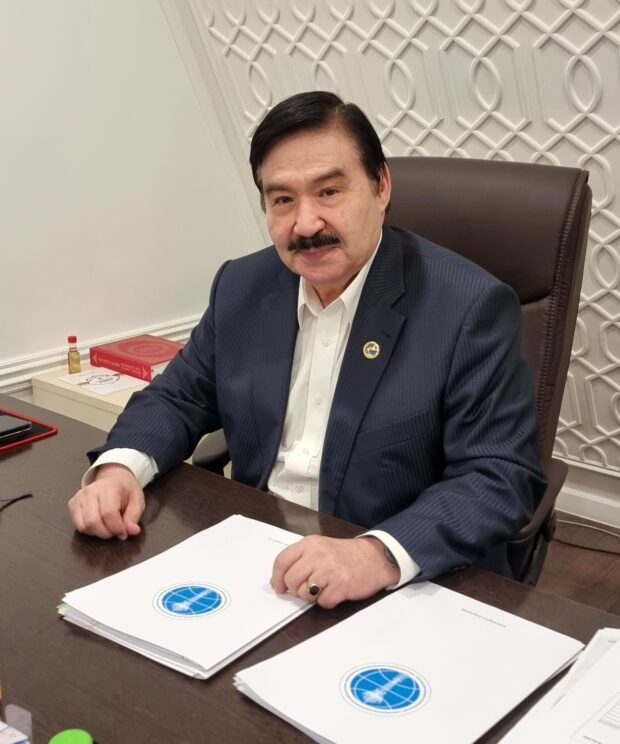ASTANA ( WNAM MONITORING ): Kazakhstan’s unique experience in fostering dialogue among religions and cultures is gaining global attention amid rising interethnic and interfaith conflicts, said Bulat Sarsenbayev, Ambassador and Advisor to the Chairman of the International Center for Interfaith and Interreligious Dialogue, in an interview with The Astana Times ahead of the eighth Congress of Leaders of World and Traditional Religions.
“It is no coincidence that the Kazakh capital has become a permanent venue and a sought-after platform for dialogue among leaders of world and traditional religions,” said Sarsenbayev, who also serves as commissioner responsible for advancing the goals of the congress.
Launched in 2003, the congress aims to promote universal values and strengthen understanding among religions, cultures and nations. Supported by Christian, Muslim, Jewish, and Buddhist, among other religious communities, it quickly established itself as a global platform. The secretariat was created to sustain the congress’s work between the triennial gatherings.
Sarsenbayev highlighted that each congress has been unique, tackling the key challenges of its time.
“For more than 20 years, we have been holding these congresses. Each one has been special, because it examined the challenges that concerned the world at that very moment. That is why all seven previous congresses have been highly substantive and truly representative,” he said.
He also recalled the instructions of President Kassym-Jomart Tokayev during the seventh congress.
“The president tasked us with drafting a Concept for the development of the congress for 2023–2033. This document, adopted by the secretariat in 2023, laid the foundation for several new initiatives. In line with it, we established the Institute of Goodwill Ambassadors and convened the Forum of Young Religious Leaders,” said Sarsenbayev.
Over the past two decades, the event has grown in scale and scope. While the first congress gathered 17 delegations, more than 100 are expected this year.
“Leaders of the world and traditional religions take part in its work. They are not always the very top leaders, but influential figures capable of making decisions within their faith communities. It is also important to note the high-level involvement of political leaders, heads of state, and international organizations,” said Sarsenbayev.
Expanding themes
Sarsenbayev noted that the theme of the eighth congress is Dialogue of Religions and Synergy for the Future. He emphasized that synergy implied cooperation and the power of joint action over individual efforts.
“Dialogue alone is not enough. We need concrete joint steps. Only by acting together can we address the challenges before us,” he said.
The upcoming congress will introduce new elements to expand its agenda. Ahead of the main gathering, a Sept. 15 working group and a Sept. 16 secretariat session will finalize the agenda and procedures. The secretariat meeting will be chaired by Maulen Ashimbayev, chairman of the Senate of the Parliament of Kazakhstan.
Sarsenbayev cited Ashimbayev’s remarks, stressing the global importance of interfaith dialogue.
“Today, we can say that thanks to the wisdom of world religious leaders at the beginning of the 21st century, humanity avoided the scenario of a ‘clash of civilizations,’” he said, quoting Ashimbayev.
Several parallel events are planned, including the Forum of Young Religious Leaders, which is being held for the second time.
“We want to ensure continuity between generations. As a rule, religious leaders are already of advanced age. That is why we want young leaders to be included in this process,” said Sarsenbayev.
For the first time, an expert group will convene to provide independent perspectives on interfaith dialogue.
“Religious leaders naturally focus on the needs of their communities. Experts can take a broader view. Their opinions are essential for us,” he said.
The event will also appoint new goodwill ambassadors and host a special session on protecting religious sites, chaired by Miguel Ángel Moratinos, the UN High Representative for the Alliance of Civilizations.
“The eighth congress is more intensive, marking a new stage as we move away from the classical format. We are diversifying the program with parallel events to fully engage participants and define next steps,” said Sarsenbayev.
Addressing modern challenges
Sarsenbayev emphasized that the forum has shifted global religious dialogue from confrontation to understanding.
“They do not come here to argue, but to listen, to share their positions, and to understand each other. That in itself is a major achievement,” he said.
Among its most important outcomes has been a consistent declaration by world and traditional religious leaders that extremism and terrorism have nothing to do with religion.
“True religion, by its very nature, is never extremist, radical, or terrorist. Those who hide behind such labels are merely exploiting faith,” said Sarsenbayev.
He also pointed to digitalization as a new challenge.
“Many people are living in virtual realities, leading to social fragmentation. It is crucial to preserve spirituality and moral education. That is precisely the role of spiritual leaders in this digital era. They are not technology experts, but they are carriers of spirituality,” said Sarsenbayev.
He described the congress as a place where global religious leaders act as beacons for their communities. Their influence extends beyond congregations to shaping decisions of governments and parliaments.
“Peace is not the absence of conflict. Conflicts have always existed and always will. Peace is understanding. And understanding arises when people of goodwill keep moving forward, searching for solutions, and building bridges. That, I believe, is the essence of this congress,” said Sarsenbayev.


